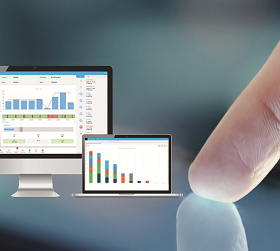Industry 4.0: Manufacturing Executing Systems
September 2019
IT in Manufacturing

Industry 4.0 is set to lead the way for digitisation of manufacturing processes. Manufacturing Executing Systems (MES) are a critical component of Industry 4.0 as they act as an enabler for end-to-end digitisation.
What is MES?
Manufacturing Executing Systems are information systems that control complex manufacturing processes on the factory floor. MES achieves this by tracking and gathering accurate, real-time data about the production lifecycle. The data which is collected is about product genealogy, performance, traceability, material management, WIP and other plant activities. The importance of the MES lies within its functionality as it serves as a layer between the enterprise resource planning (ERP) and the process control systems on the factory floor, giving manufacturers real-time workflow visibility and insight into how best to improve manufacturing operations across the enterprise.
How Industry 4.0 influences MES
Industry 4.0 dictates the end of traditional centralised applications for production control. Industry 4.0’s vision of ecosystems of smart factories with intelligent and autonomous shop-floor entities is inherently decentralised. A new environment is created due to customer demands for tailor-made products. These plants are fuelled by technology enablers such as 3D printing, Internet of Things (IoT), Cloud Computing, mobile devices and Big Data. Future manufacturing systems, including MES, will have to be built to support this paradigm shift.
Lighthouse MES
S4 Integration offers the South African market a tried and tested MES/MOM platform. Lighthouse MES is modular, consisting of the four main areas of manufacturing operations, namely: production operations, quality operations, inventory operations and maintenance operations.
Lighthouse MES software allows organisations achieve:
• Smart manufacturing through the digitisation of manufacturing processes and operations.
• An uninterrupted thread of time critical data throughout the manufacturing operation.
• An improvement in efficiency, output, compliance and customer satisfaction and.
• The removal of traditional organisational silos to optimise business practices.
S4 Integration offers Lighthouse MES to the end customer covering installation, integrations, development and support. With a number of local installations within the automotive and packaging sector, Lighthouse MES has become synonymous with a Manufacturing Executing System with measurable benefits to the end user.
For more information contact Sigourney Bruintjies, S4 Integration, +27 41 451 1250, [email protected], www.s4.co.za
Further reading:
OMRON simplifies safety verification for SA manufacturers
Omron Electronics
IT in Manufacturing
OMRON’s NX Safety platform, Online Safety Functional Test Verification is a feature built into the Sysmac Studio engineering environment. This intuitive tool allows safety verification to be carried out digitally, with step-by-step guidance and full traceability, all from a single workstation.
Read more...
Range of CDUs to meet the rising demands of HPC and AI workloads
Schneider Electric South Africa
IT in Manufacturing
Motivair by Schneider Electric has introduced two new coolant distribution units that are engineered to meet the rising thermal demands of HPC and AI workloads.
Read more...
Data centre design powers up for AI, digital twins and adaptive liquid cooling
IT in Manufacturing
The Vertiv Frontiers report, which draws on expertise from across the organisation, details the technology trends driving current and future data centre innovation, from powering up for AI, to digital twins, to adaptive liquid cooling.
Read more...
Siemens drives next-generation vehicle development
Siemens South Africa
IT in Manufacturing
The Siemens PAVE360 Automotive technology is a new category of digital twin software that is pre-integrated and designed as an off-the-shelf offering to address the escalating complexity of automotive hardware and software integration.
Read more...
How digital infrastructure design choices will decide who wins in AI
Schneider Electric South Africa
IT in Manufacturing
As AI drives continues to disrupt industries across the world, the race is no longer just about smarter models or better data. It’s about building infrastructure powerful enough to support innovation at scale.
Read more...
How quantum computing and AI are driving the next wave of cyber defence innovation
IT in Manufacturing
We are standing at the edge of a new cybersecurity frontier, shaped by quantum computing, AI and the ever-expanding IIoT. To stay ahead of increasingly sophisticated threats, organisations must embrace a new paradigm that is proactive, integrated and rooted in zero-trust architectures.
Read more...
2026: The Year of AI execution for South African businesses
IT in Manufacturing
As we start 2026, artificial intelligence in South Africa is entering a new era defined not by experimentation, but by execution. Across the region, the conversation is shifting from “how do we build AI?” to “how do we power, govern and scale it responsibly?”
Read more...
AIoT drives transformation in manufacturing and energy industries
IT in Manufacturing
AIoT, the convergence of artificial intelligence and the Internet of Things, is enhancing efficiency, security and decision making at manufacturing, industrial and energy companies worldwide
Read more...
Today’s advanced safety system is but the beginning
Schneider Electric South Africa
IT in Manufacturing
Industrial safety systems have come a long way since the days of hardwired emergency shutdowns. Today, safety systems are not just barriers against risk; they are enablers of safer operations.
Read more...
Siemens brings the industrial metaverse to life
Siemens South Africa
IT in Manufacturing
Siemens has announced a new software solution that builds Industrial metaverse environments at scale, empowering organisations to apply industrial AI, simulation and real-time physical data to make decisions virtually, at speed and at scale.
Read more...


